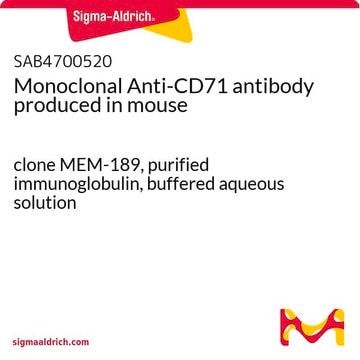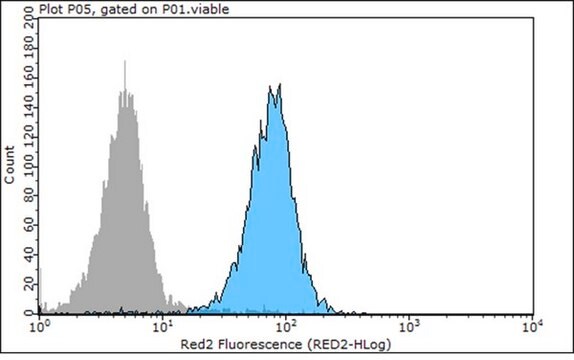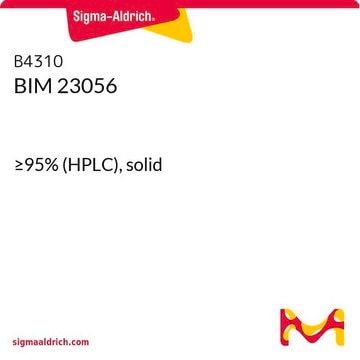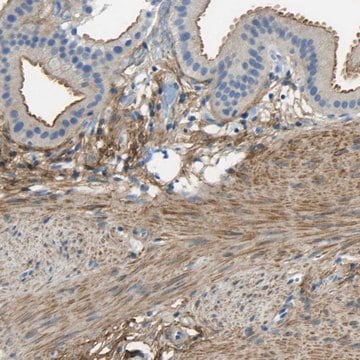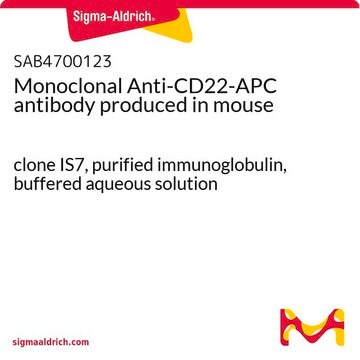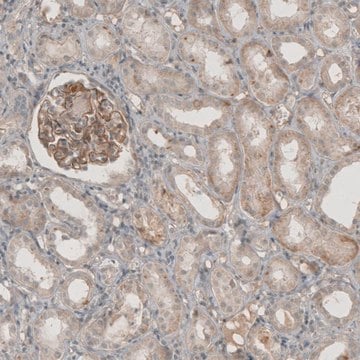SAB4700515
Monoclonal Anti-CD71 antibody produced in mouse
clone MEM-75, purified immunoglobulin, buffered aqueous solution
Synonym(e):
Anti-TFRC, Anti-Transferrin Receptor
Anmeldenzur Ansicht organisationsspezifischer und vertraglich vereinbarter Preise
Alle Fotos(1)
About This Item
UNSPSC-Code:
12352203
NACRES:
NA.41
Empfohlene Produkte
Biologische Quelle
mouse
Qualitätsniveau
Konjugat
unconjugated
Antikörperform
purified immunoglobulin
Antikörper-Produkttyp
primary antibodies
Klon
MEM-75, monoclonal
Form
buffered aqueous solution
Speziesreaktivität
human
Konzentration
1 mg/mL
Methode(n)
flow cytometry: suitable
Isotyp
IgG1
NCBI-Hinterlegungsnummer
UniProt-Hinterlegungsnummer
Versandbedingung
wet ice
Lagertemp.
2-8°C
Posttranslationale Modifikation Target
unmodified
Angaben zum Gen
human ... TFRC(7037)
Allgemeine Beschreibung
Cluster of differentiation 71 (CD71), also known as transferrin receptor, is encoded by the gene mapped to human chromosome 3q29. CD71 is present on cells with high proliferation.
The antibody MEM-75 reacts with CD71 antigen (transferrin receptor), a 95 kDa type II homodimeric transmembrane glycoprotein expressed on activated B and T lymphocytes, macrophages and erythroid precursors; it is lost on resting blood leukocytes.
Immunogen
NALM-6 human pre-B cell line
Anwendung
Monoclonal Anti-CD71 antibody produced in mouse has been used in co-immunoprecipitation assay.
The reagent is designed for Flow Cytometry analysis. Suggested working dilution for Flow Cytometry is 4 μg/mL of sample. Indicated dilution is recommended starting point for use of this product. Working concentrations should be determined by the investigator.
Biochem./physiol. Wirkung
Cluster of differentiation 71 (CD71) functions as an iron regulatory protein. Overexpression of the gene has been associated with the development of various types of cancers, including cholangiocarcinoma (CCA). Thus, CD71 protein is considered as a potential therapeutic target for CCA and iron overload. The encoded protein facilitates mitochondrial respiration and reactive oxygen species (ROS) production in human pancreatic ductal adenocarcinoma (PDAC) cells, which is essential for their tumorigenic growth. Thus, aberrant expression of CD71 might also lead to the development of pancreatic cancer.
Leistungsmerkmale und Vorteile
Evaluate our antibodies with complete peace of mind. If the antibody does not perform in your application, we will issue a full credit or replacement antibody. Learn more.
Physikalische Form
Solution in phosphate buffered saline, pH 7.4, with 15 mM sodium azide.
Haftungsausschluss
Unless otherwise stated in our catalog or other company documentation accompanying the product(s), our products are intended for research use only and are not to be used for any other purpose, which includes but is not limited to, unauthorized commercial uses, in vitro diagnostic uses, ex vivo or in vivo therapeutic uses or any type of consumption or application to humans or animals.
Sie haben nicht das passende Produkt gefunden?
Probieren Sie unser Produkt-Auswahlhilfe. aus.
Lagerklassenschlüssel
10 - Combustible liquids
Flammpunkt (°F)
Not applicable
Flammpunkt (°C)
Not applicable
Hier finden Sie alle aktuellen Versionen:
Besitzen Sie dieses Produkt bereits?
In der Dokumentenbibliothek finden Sie die Dokumentation zu den Produkten, die Sie kürzlich erworben haben.
Upregulation of transferrin receptor-1 induces cholangiocarcinoma progression via induction of labile iron pool
Jamnongkan W
Tumour Biology : the Journal of the International Society For Oncodevelopmental Biology and Medicine, 39 (2017)
Roquin binds microRNA-146a and Argonaute2 to regulate microRNA homeostasis
Srivastava M
Nature Communications (2015)
Transferrin receptor (CD71) is a marker of poor prognosis in breast cancer and can predict response to tamoxifen
Habashy HO
Breast Cancer Research and Treatment, 119, 283-293 (2010)
Transferrin receptor regulates pancreatic cancer growth by modulating mitochondrial respiration and ROS generation.
Jeong SM
Biochemical and Biophysical Research Communications, 471, 373-379 (2016)
NotI linking/jumping clones of human chromosome 3: mapping of the TFRC, RAB7 and HAUSP genes to regions rearranged in leukemia and deleted in solid tumors.
Kashuba VI
Febs Letters, 419, 181-185 (1997)
Unser Team von Wissenschaftlern verfügt über Erfahrung in allen Forschungsbereichen einschließlich Life Science, Materialwissenschaften, chemischer Synthese, Chromatographie, Analytik und vielen mehr..
Setzen Sie sich mit dem technischen Dienst in Verbindung.